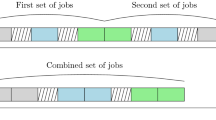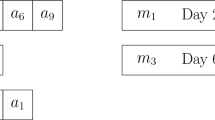Abstract
The scheduling of maintenance activities has been extensively studied, with most studies focusing on single-machine problems. In real-world applications, however, multiple machines or assembly lines process numerous jobs simultaneously. In this paper, we study a parallel-machine scheduling problem in which the objective is to minimize the total tardiness given that there is a maintenance activity on each machine. We develop a branch-and-bound algorithm to solve the problem with a small problem size. In addition, we propose a hybrid genetic algorithm to obtain the approximate solutions when the number of jobs is large. The performance of the proposed algorithms is evaluated based mainly on computational results.



Similar content being viewed by others
References
Adiri I, Frostig E and Rinnooy Kan AHG (1991). Scheduling on a single machine with a single breakdown to minimize stochastically the number of tardy jobs. Naval Research Logistics 38 (2): 261–271.
Azizoglu M and Kirca O (1998). Tardiness minimization on parallel machines. International Journal of Production Economics 55 (2): 163–168.
Chen WJ (2009). Minimizing number of tardy jobs on a single machine subject to periodic maintenance. Omega 37 (3): 591–599.
Chen CC (2014). TOYOTA: Let’s Go Places, http://www.toyota.com.tw/, accessed on 1 December 2014.
Cheng TCE, Hsu CJ and Yang DL (2011). Unrelated parallel-machine scheduling with deteriorating maintenance activities. Computers & Industrial Engineering 60 (4): 602–605.
Du J and Leung JYT (1990). Minimizing total tardiness on one machine is NP-hard. Mathematics of Operations Research 15 (3): 483–495.
Ghodratnama A, Rabbani M, Tavakkoli-Moghaddam R and Baboli A (2010). Solving a single-machine scheduling problem with maintenance, job deterioration and learning effect by simulated annealing. Journal of Manufacturing Systems 29 (1): 1–9.
Goldberg DE and Lingle R (1985). Alleles, loci and the traveling salesman problem. In: Proceedings of an International Conference on Genetic Algorithms and Their Application. Lawrence Erlbaum Associates: Hillsdale, NJ, pp 154-159.
Gustavsson E, Patriksson M, Stromberg AB, Wojciechowski A and Onnheim M (2014). Preventive maintenance scheduling of multi-component systems with interval costs. Computers & Industrial Engineering 76: 390–400.
Huang TB (2014). Cheng Drong Aluminium Co., Ltd., http://www.cdal.com.tw/, accessed on 1 December 2014.
Joo CM and Kim BS (2013). Genetic algorithms for single machine scheduling with time-dependent deterioration and rate-modifying activities. Expert Systems with Applications 40 (8): 3036–3043.
Lee JY and Kim YD (2012). Minimizing the number of tardy jobs in a single-machine scheduling problem with periodic maintenance. Computers & Operations Research 39 (9): 2196–2205.
Lee CY and Liman SD (1992). Single machine flow-time scheduling with scheduled maintenance. Acta Informatica 29 (4): 375–382.
Lopez EG and O’Neill M (2009). On the effects of locality in a permutation problem: The Sudoku puzzle. In: IEEE Symposium on Computational Intelligence and Games. 7–10 September, IEEE: Milano, Italy, pp 80–87.
Luo W, Cheng TCE and Ji M (2015). Single-machine scheduling with a variable maintenance activity. Computers & Industrial Engineering 79: 168–174.
Ma Y, Chu C and Zuo C (2010). A survey of scheduling with deterministic machine availability constraints. Computers & Industrial Engineering 58 (2): 199–211.
Madhushini N, Rajendran C and Deepa Y (2009). Branch-and-bound algorithms for scheduling in permutation flowshops to minimize the sum of weighted flowtime/sum of weighted tardiness/sum of weighted flowtime and weighted tardiness/sum of weighted flowtime, weighted tardiness and weighted earliness of jobs. Journal of the Operational Research Society 60 (7): 991–1004.
Pinedo ML (2008). Scheduling: Theory, Algorithms, and System. 3rd edn, Prentice-Hall: New Jersey.
Qi X, Chen T and Tu F (1999). Scheduling the maintenance on a single machine. Journal of the Operational Research Society 50 (10): 1071–1078.
Sbihi M and Varnier C (2008). Single-machine scheduling with periodic and flexible periodic maintenance to minimize maximum tardiness. Computers & Industrial Engineering 55 (4): 830–840.
Schaller J and Valente JMS (2012). An evaluation of heuristics for scheduling a non-delay permutation flow shop with family setups to minimize total earliness and tardiness. Journal of the Operational Research Society 64 (6): 805–816.
Schmidt G (2000). Scheduling with limited machine availability. European Journal of Operational Research 121 (1): 1–15.
Shen L, Wang D and Wang XY (2013). Parallel-machine scheduling with non-simultaneous machine available time. Applied Mathematical Modelling 37 (7): 5227–5232.
Shim SO and Kim YD (2007). Scheduling on parallel identical machines to minimize total tardiness. European Journal of Operational Research 177 (1): 135–146.
Wang JB and Wei CM (2011). Parallel machine scheduling with a deteriorating maintenance activity and total absolute differences penalties. Applied Mathematics and Computation 217 (20): 8093–8099.
Xu D and Xiong S (2012). Minimizing total flow time in the single-machine scheduling problem with periodic maintenance. Journal of the Operational Research Society 63 (4): 567–567.
Yang SJ (2010). Single-machine scheduling problems with both start-time dependent learning and position dependent aging effects under deteriorating maintenance consideration. Applied Mathematics and Computation 217 (7): 3321–3329.
Yang SJ (2012). Single-machine scheduling problems simultaneously with deterioration and learning effects under deteriorating multi-maintenance activities consideration. Computers & Industrial Engineering 62 (1): 271–275.
Yang SJ (2013). Unrelated parallel-machine scheduling with deterioration effects and deteriorating multi-maintenance activities for minimizing the total completion time. Applied Mathematical Modelling 37 (5): 2995–3005.
Yang SL, Ma Y, Xu DL and Yang JB (2011). Minimizing total completion time on a single machine with a flexible maintenance activity. Computers & Operations Research 38 (4): 755–770.
Yin YQ, Wu WH, Wu WH and Wu CC (2014). A branch-and-bound algorithm for a single machine sequencing to minimize the total tardiness with arbitrary release dates and position-dependent learning effects. Information Sciences 256: 91–108.
Yu X, Zhang Y, Xu D and Yin Y (2013). Single machine scheduling problem with two synergetic agents and piece-rate maintenance. Applied Mathematical Modelling 37 (3): 1390–1399.
Acknowledgements
The authors are grateful to the editor and the referees, whose constructive comments have led to a substantial improvement in the presentation of the paper. We would also thank T.B. Huang for giving us the real-world application. The first author was supported under NSC 100-2221-E-035-029-MY3 and the second author was supported under NSC 102-2221-E-241 -018.
Author information
Authors and Affiliations
Corresponding author
Rights and permissions
About this article
Cite this article
Lee, WC., Wang, JY. & Lee, LY. A hybrid genetic algorithm for an identical parallel-machine problem with maintenance activity. J Oper Res Soc 66, 1906–1918 (2015). https://doi.org/10.1057/jors.2015.19
Received:
Accepted:
Published:
Issue Date:
DOI: https://doi.org/10.1057/jors.2015.19




